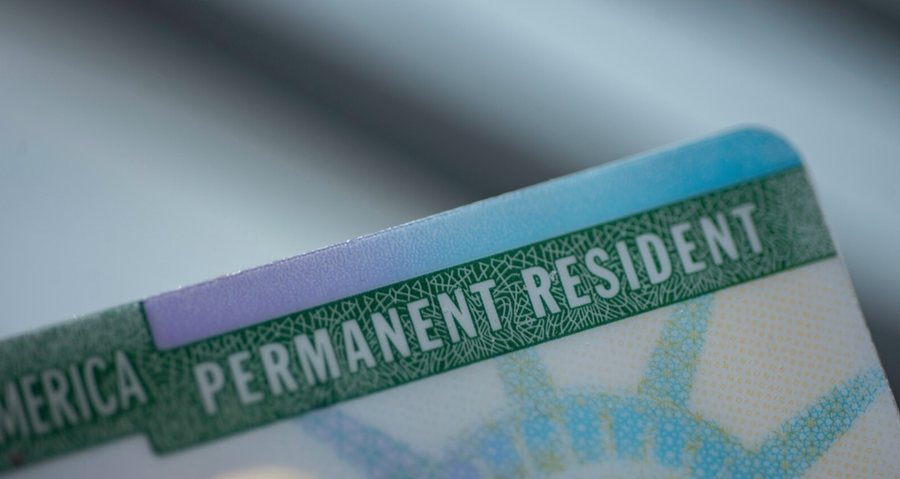
The arrest of Palestinian activist Mahmoud Khalil, a longtime resident of the United States who played a prominent role in last year's protests at Columbia University over the war in Gaza, has raised questions about the so-called 'green card'.
Activist Khalil received his green card in 2024, securing legal residency status. But permanent residents can lose this status and face deportation if they violate immigration law.
A federal judge on Wednesday expanded efforts to block the deportation of Khalil, a New York resident who remains in custody in Louisiana, although he has not been charged with any crime. It is not a crime to oppose, even openly, the policies or actions of the U.S. government, and the Bill of Rights protects free speech and the right to assemble.
What are the reasons why permanent resident status can be revoked?
Green cards could be taken away, New York immigration attorney Linda Dakin-Grimm tells VOA.
"It's not that common, but it's not that rare either. The most common cases are when people are convicted of crimes. … A green card is not citizenship. It's considered a privilege that you earn, but you can also lose it if you do something that violates the conditions for permanent resident status," she says.
Examples of criminal offenses that could lead to the loss of this status include serious crimes, drug-related offenses, fraud, or national security considerations, such as ties to a terrorist group. Status can also be removed if someone is deemed to be a threat to national security.
If a green card holder is charged with a crime, his or her criminal case will go through the justice system. But the process for revoking their permanent status takes place in immigration court, where officials must present evidence to justify revoking the status.
The process of removing status
Revocation of a green card is a legal process that begins when the US government determines that an individual has violated immigration laws.
The government can learn about such cases in various ways, whether through a routine immigration check, law enforcement investigation, or whistleblowers.
“Theoretically it could be someone who is a whistleblower. Someone who has some information. … Could they call the State Department? Maybe. Could they call the ICE hotline? Maybe,” Ms. Dakin-Grimm says.
The Department of Homeland Security usually initiates the process. The person is sent a document known as a Notice to Appear in Immigration Court or, in serious cases, they may be arrested and detained.
White House officials said Wednesday that Secretary of State Marco Rubio has the authority to revoke a green card or any visa if an individual's activities in the United States "would have serious negative foreign policy consequences" for the country.
Mr. Rubio has said that Khalil's case is not about free speech. "The green card is not fair to anyone. ... If you had told us that this was what you intended to do when you came to America, we would never have allowed you in," Mr. Rubio said Wednesday. "If you do something like that once you get in, we will revoke it and deport you."
The Secretary of State's authority to intervene in a case like Khalil's stems from the Immigration and Nationality Act of 1952. A provision in the law allows the Secretary of State to deem a noncitizen deportable if their presence or activities are believed to substantially harm U.S. foreign policy interests.
According to the announcement for Khalil, Mr. Rubio made the determination. Khalil has been ordered to appear before an immigration judge on March 27 at the Lasalle Detention Facility in Louisiana. Court In immigration court, the burden of proof is on the government; it must show that the person violated immigration laws.
In a case like Khalil's, ICE (Immigration and Customs Enforcement) lawyers seek deportation, but they must prove that he is a threat to national security.
A green card holder may also be represented by defense attorneys. In the criminal justice system, if a person cannot afford a lawyer, the government must provide a public defender. However, in immigration court, immigrants have the right to their own lawyer, but the government does not have to provide one. If immigrants cannot afford a lawyer or cannot find someone to represent them pro bono, they do not have access to legal representation.
Dakin-Grimm says the process can sometimes be quick, but it's also complex. In the immigration court system, the decision to revoke a green card is an administrative procedure conducted by the Department of Justice, under an office known as the Executive Office for Immigration Status Review.
“It’s more or less like the government is prosecuting a case and the judge is also the government,” says Ms. Dakin-Grimm.
Result of the process
If the immigration judge rules against the green card holder, they can appeal to the Board of Immigration Appeals (BIA). And if the BIA agrees with the government, the card holder can appeal to a federal appeals court. Although the case can end up in the U.S. Supreme Court, Ms. Dakin-Grimm says that rarely happens, largely because the Supreme Court decides the cases it chooses entirely on its own.
"Most people can't afford to do this kind of legal work themselves. It's very, very expensive – hundreds of thousands of dollars to take a case from the court level to the Supreme Court," she says.
"But in the immigration system, there are non-profit organizations, legal clinics, that work pro bono, so for free, in important cases like this."
Final decision
If the green card is revoked and all appeals fail, the person is usually deported from the U.S. If the appeal is successful, the person keeps the green card and is allowed to remain in the country.
Ms. Dakin-Grimm said many green card holders think that because it's called "permanent residence," the status is truly permanent. "But it's only permanent as long as you follow the rules," she said. VOA (A2 Televizion)











